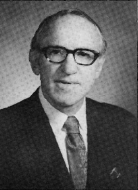
Lou Wilderman was a true pioneer in the representation of working people in Philadelphia. After graduating from Wharton and the University of Pennsylvania Law School, Lou began practicing law in 1933, and started representing labor unions in 1937. He quickly developed a large and renowned practice in that area, and was one of the tiny handful of lawyers who established the roots of all the union-side labor law firms in Philadelphia that have followed in his footsteps ever since.
Lou joined our group of partners in 1972 and his contributions to our practice were and remain inestimable. While his legal knowledge in his specialty was literally unmatched, Lou’s street-smart sense of strategy he learned growing up in the neighborhoods of pre-Depression Philadelphia gave him a profound but commonsense ability to solve almost any problem. And his well-earned reputation of confounding the large management-side firms who opposed him – not to mention the judges he appeared before – was truly astounding.
Many described Lou as the most tenacious negotiator they had ever seen. Lou would not get off a point, or give up an argument. He simply wore the other side down. But while he was forceful in his attack, he never had to shout and hardly ever raised his voice. Lou didn’t put on a show. Instead he wore you down with a constant torrent of words, logic and controlled emotion.
Here’s one example of quintessential Wildermania. At one emergency injunction, the company complained that workers on strike wouldn’t let trucks on site, were threatening supervisors and were engaging in all sorts of un-American activities. Many judges will automatically slap an injunction on the union in that situation, without a hearing. In Philadelphia, the first round of these contests occurs in the Judge’s chambers where, if the parties can’t agree to some fixed number of pickets, the Judge will do it for them and then schedule the case for a formal hearing in 5 days.
Many employer lawyers, and some union lawyers, treat these conferences as somewhat routine exercises. Not Lou Wilderman. He knew that the temporary restraining order phase is often the most important part of the process. It can make or break the strike; determine at the very beginning if it will be won or lost.
In this particular case, the company’s lawyer went through his list of horribles, in a sort of matter-of-fact kind of way. He sat back and relaxed, confident he’d get his injunction, limiting the pickets to two, far away from the job site.
The Judge asked Lou if he had anything to say. Lou gave his typical explanation – the affidavits were wrong – were exaggerated. Limiting pickets would drain the life blood from the strike. The company didn’t need an injunction – their – using the legal term – scabs could get into work. The workers had legitimate, important complaints. A court order would be like throwing oil on the fire.
Then he really got started.
“Judge,” Lou urged, “you can’t issue an injunction – it will be the penny in the cake.” Neither the Judge or the other lawyers (including Lou’s young associate who was accompanying him) had the slightest idea what Lou was talking about. But Lou kept harping on it – and the Judge was taking notice. He was paying attention to Lou. Lou kept coming back to it – the company doesn’t know what it’s talking about – this isn’t the way to settle this strike – it’s the penny in the cake. Over and over again Lou invoked the penny in the cake – whatever the heck that was.
The Judge clearly was lost, but mesmerized. Finally, the Judge turned to the company lawyer – “Don’t you think Mr. Wilderman has a good point?”
The lawyer scrambled to regain his balance. Lou chimed in, “Sure, it’s the penny in the cake.” Too late. The lawyer had lost it. No matter what he said, the Judge had make his decision. The lawyer talked, Lou would dismiss what he said with a wave of the hand. “Judge,” he’d say, “it’s the penny in the cake.”
The Judge denied the company’s request for an injunction. As Lou left, he was still on the lawyer’s case – “Tell the company, settle the strike. But don’t come here. It would just be the penny in the cake.”
Lou taught us, once you get what you want, leave fast, so someone doesn’t change his mind. This was especially important where – like then – we had no case. The young associate asked him, “Lou, what is the penny in the cake?” With a little grin and a twinkle in his eye, Lou answered – “You don’t know what’s the penny in the cake?”
We’ve spent years, with no success, trying to find anyone who could tell us, what is the penny in the cake.
For those of us who were fortunate enough to have practiced with him and who have gleaned from that experience even a fraction of his brilliance, Lou’s legacy lives on in the strategic legal solutions we offer our clients today.
